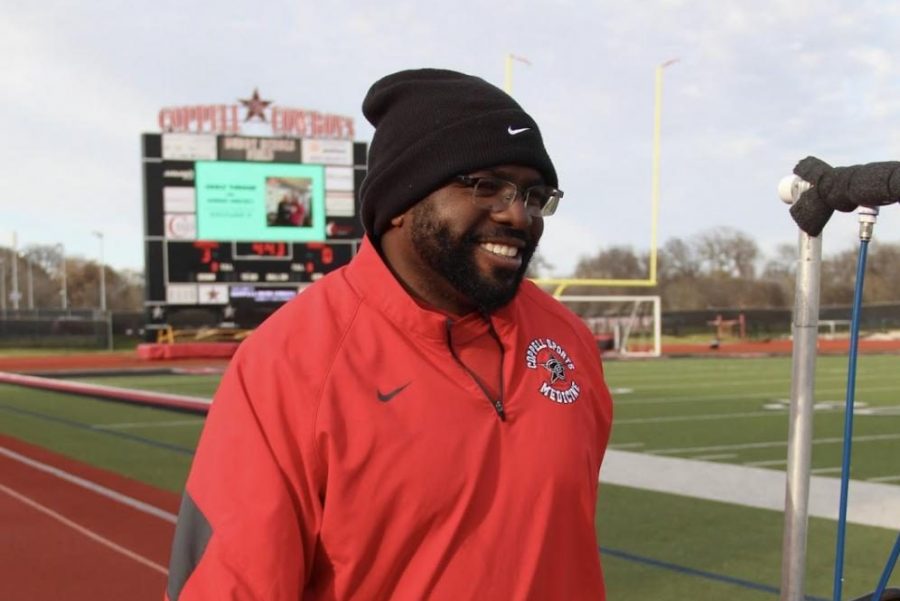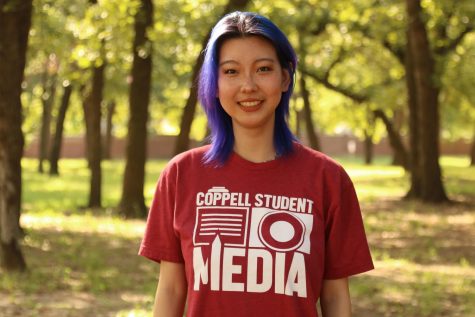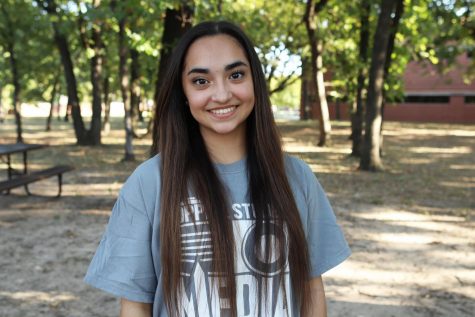Black History Month Q&A: Terrell flipping the stereotypes
Coppell High School and CHS9 athletic trainer and sports medicine instructor Brian Terrell carries equipment to a cart at Buddy Echols Field on Tuesday. Terrell is a trainer at CHS and CHS9 and enjoys helping athletes face and overcome their challenges. Photo by Camila Flores
February 28, 2020
Brian Terrell has worked in Coppell ISD for three years as an athletic trainer and sports medicine instructor for Coppell High School and CHS9. Before he went into athletic training, he worked for eight years as a physical therapy assistant with a background in medical research. Terrell then studied at the University of Texas at Arlington, graduating in three years with a degree in athletic training.
Who are some African American leaders who have inspired you?
Frederick Douglas, Langston Hughes, W. E. B. Du Bois. I’m a thinker, so the ones who inspire me are the thinkers: the creative thinkers, the boundary pushers. The ones who, when people say that African Americans are not intelligent, are the ones who say that ‘no, we are smart. We can come up with creative new ways of thinking, whether that’s philosophy, poetry or music and art and dance. We’re not just athletes. We have brains also.’
What have you learned about people’s perception of race?
There’s not a lot of African-American athletic trainers around in any capacity. [At one point in time], I had an older Caucasian gentleman tell me ‘you’re really good at what you do. You don’t see a lot of African American trainers because of the work it takes to do it.’ And it bothered me.
It’s true, it’s a lot of hard work being an athletic trainer. But it bothered me how he said that, and I thought about it, and I realized that that’s always how [others have] viewed us. They viewed African Americans as lazy and unwilling to put in the work or the effort. And I responded to that by completely changing that man’s perception. I took what he thought about me and I flipped it, to [the point] where he was nominating me for a state award for being one of the best athletic trainers in the state. It’s all about taking someone’s perception of you and what they think they know, and flipping it. Showing them that ‘no, it’s not true. You can’t put everyone in that same category’.
What are some challenges you have faced to get where you are now?
I hate to say stereotypes, but they exist. They exist everywhere. And whether I choose to acknowledge them or not, there’s always going to be someone who looks at me differently or have some stereotype about me and think something based on what they think they know about black people.
They might think that we’re not as good as everyone else, or that we don’t know as much as someone else. I actually struggled with that a lot when I first started. Because I felt that people would look at me differently, I did something called alphabet chasing. I chased all of these certifications just so I can get letters behind my name in the hopes that it would get people to look at me the same way they looked at each other.
Compared to when you were younger, has diversity in the athletic training field increased?
There’s a lot more ethnic diversity councils. The [National Athletic Trainers Association] was established just two years ago. Their mission is to get out to underprivileged communities and talk to them about athletic training.
As an African American trainer, when you think about sports and its landscape, most of the sports are about 80 to 90 percent African American or minority athletes. But there’s not a lot of health workers [who] look like them. We all have certain stereotypes, and we are drawn to people who look like us. A lot of the time, athletes didn’t want to go and talk to the medical professionals, not because they didn’t trust them, but just because they weren’t comfortable approaching them because they didn’t look like them.
What motivates you to excel at your job?
Athletes. You might hear a lot of athletic trainers say that, but really. They’re what get me up in the morning. Knowing that they’re depending on me to help them and give them guidance, that’s what gets me up in the morning. And not just showing up, but coming with a positive smile on my face so that they know that it’s not the end. That even if they never get back into a sport, there’s someone out there who really cares for them. Not just as an athlete, but as a person.
I enjoy working with them. I enjoy watching [them] overcome a challenge. Just being there for them, pushing them and leading them in the right direction and watching them do something amazing after coming off of an injury with a smile on their face — it makes it all worth it for me. The 70 plus hours a week are all worth it because of just that one moment.
Is there a particular African American artist or musician or actor that had a large impact on your life?
I grew up in San Angelo, Texas. It was a pretty small community at the time, and the options for the African Americans living there were very limited. Either you went to high school, graduated, stayed in San Angelo and became nothing of yourself, or you went off and you found something different. My whole thing was getting out of there. I think I was in the seventh grade, and at the time, Notorious B.I.G., Biggie Smalls, came out, and he had a song called “Juicy.” It talked about his humble beginnings and his upbringing and how people shunned him. It was about his mom and how hard she worked to maintain things, and how when he finally reached this level of success, his whole life changed.
But through that entire process of getting there, he was still the same person. It just took him hard work and overcoming different adversities, self-inflicted or [otherwise]. And that song actually pushed me a lot. Sometimes, when I had big tests or something like that, I listened to the song and it really calmed me down so I could focus. I still listen to the song now. It tells me, ‘hey, you’ve been through so many other things, and compared to that, this is something very minor. You can do this.’
Why do you think it’s important to continue to encourage diversity?
It’s so important in every field. Different people have different cultures that contribute different strengths and different ideas and different ways of motivating people. Inclusion has never been a bad thing because it brings so many ideas to the pot, so that you can just mix it all and come up with better approaches to problems. The more ideas you have, the better something will be. And we need that. We need diversity to make our world better.
Follow Joanne @joannekkim on Twitter.












Victoria Hertel • Feb 29, 2020 at 12:04 pm
I enjoyed reading your Q&A Joanne! The questions you asked were so insightful and I know that this story will inspire someone out there.